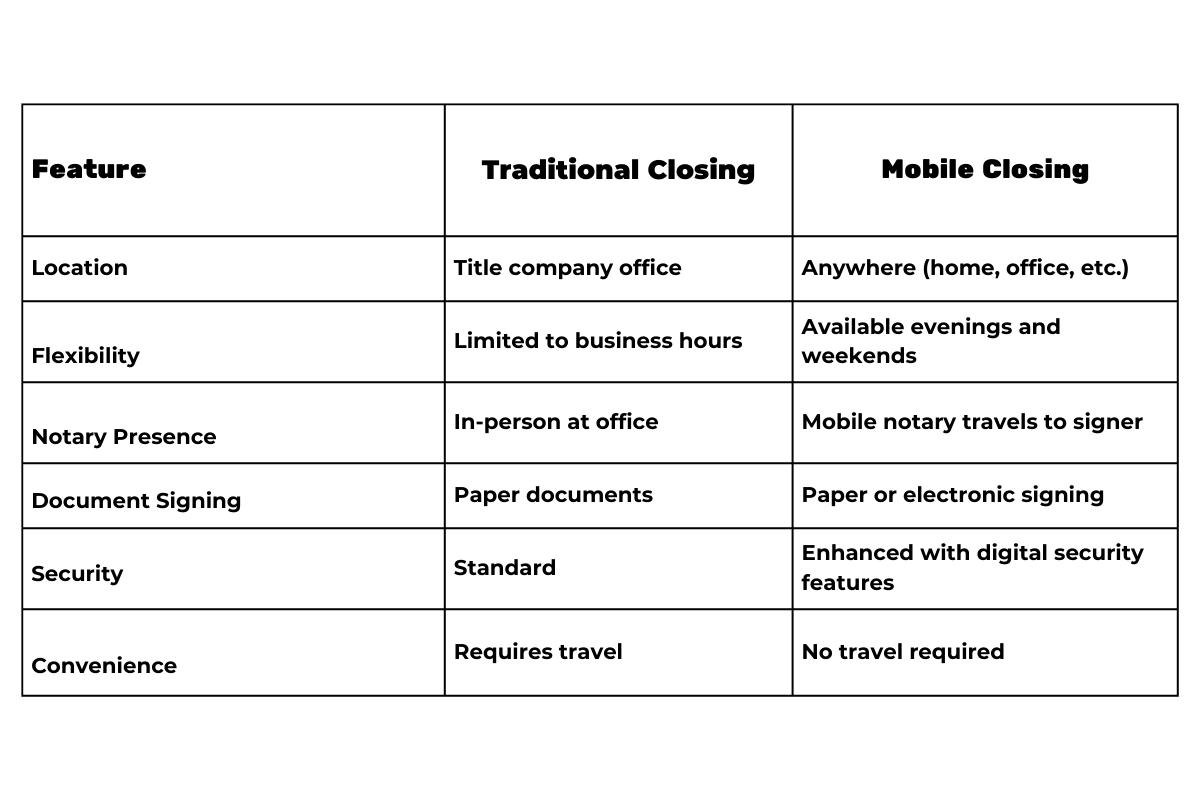
12 Mar Mobile closings prove to be convenient option
The Convenience of Mobile Closings: How They Work and Why They Matter
In the fast-paced world of real estate, convenience is key. Homebuyers, sellers, and real estate agents want to make transactions easier. One big change in recent years is mobile closings.
A mobile closing is also known as a remote closing or mobile notary closing. It allows buyers and sellers to complete real estate deals without visiting an office.
This process is changing how title and escrow companies work. It makes closings easier and faster for everyone involved.
What Are Mobile Closings?
A mobile closing is a real estate transaction in which the closing documents are signed at a location of the client’s choosing, rather than at a traditional title company office.
This service is typically facilitated by a mobile notary or signing agent who meets the buyer or seller at a designated location, such as their home, office, or a neutral meeting place. Some mobile closings also incorporate digital elements, allowing for electronic signatures and remote online notarization.
Mobile closings are particularly beneficial for buyers and sellers with demanding schedules, those in remote locations, or individuals who prefer a more flexible approach to finalizing their real estate transactions.
The Process of a Mobile Closing
Mobile closings follow a structured process to ensure a smooth and legally compliant transaction. Below is a step-by-step breakdown of how a mobile closing typically works:
1. Scheduling the Closing
Once the real estate transaction is ready to close, the title and escrow company coordinates with the buyer, seller, and lender (if applicable) to set a closing date and time. The parties involved can request a mobile closing and select a convenient location.
2. Document Preparation
The title company prepares all necessary closing documents, including the settlement statement, deed, mortgage, promissory note, and other required paperwork. If electronic notarization is used, the documents may be uploaded to a secure digital platform for review and signing.
3. Assigning a Mobile Notary
A mobile notary public or signing agent is assigned to facilitate the closing. This professional is responsible for verifying the identities of the signers, witnessing signatures, and ensuring that all documents are signed and notarized correctly.
4. Conducting the Closing Appointment
On the scheduled day, the mobile notary meets with the buyer and/or seller at the designated location. The notary walks the signers through the documents, answering questions within the scope of their authority. The signers then execute the documents, and the notary notarizes where required.
5. Document Review and Submission
After the closing appointment, the completed documents are returned to the title and escrow company. This may be done via overnight courier, secure digital transmission, or hand delivery, depending on the process used.
6. Finalizing the Transaction
The title company reviews the documents for accuracy and completeness. Once verified, the funds are disbursed, the title is officially transferred, and the transaction is recorded with the appropriate county office. The new homeowners receive their keys, and the process is complete.
Benefits of Mobile Closings
Mobile closings offer numerous advantages to buyers, sellers, real estate agents, and lenders. Here are some of the key benefits:
1. Convenience
Mobile closings eliminate the need for clients to travel to a title company office, making the process much more accessible. Whether at home, work, or another location, signers can finalize their transaction without disrupting their schedules.
2. Flexibility
With mobile closings, appointments can be scheduled at a time that works best for all parties involved, including evenings and weekends. This flexibility is especially helpful for clients with busy work schedules or those in different time zones.
3. Faster Closings
By removing the need for in-office visits, mobile closings can often be completed more quickly. This helps real estate transactions move forward without unnecessary delays, reducing the risk of closing extensions.
4. Improved Accessibility
For buyers and sellers in rural or remote areas, mobile closings provide an opportunity to complete transactions without the need for long-distance travel. This also benefits individuals with mobility challenges who may find it difficult to visit a physical office.
5. Enhanced Security and Compliance
Mobile closings conducted with digital notarization and electronic signatures offer additional layers of security, ensuring documents are signed correctly and protected from fraud. Many digital platforms provide audit trails and encryption for added protection.
Mobile Closings vs. Traditional Closings
While traditional in-office closings remain a popular choice, mobile closings offer an alternative that caters to modern preferences and needs. Below is a comparison of the two:

The Future of Mobile Closings
As technology continues to advance, mobile closings are expected to become even more streamlined and widely adopted. The integration of remote online notarization (RON), artificial intelligence-driven document review, and blockchain-based transaction tracking are shaping the future of real estate transactions. Title and escrow companies that embrace these innovations will offer an even more seamless and efficient closing experience for their clients.
Conclusion
Mobile closings are revolutionizing the way real estate transactions are finalized. By offering convenience, flexibility, and enhanced security, they cater to the needs of modern homebuyers, sellers, and industry professionals.
As the real estate landscape continues to evolve, mobile closings will play an increasingly vital role in making transactions smoother and more efficient. If you’re looking for a hassle-free way to close on your home, consider working with a title and escrow company like Access Title & Escrow that offers mobile closing services.

